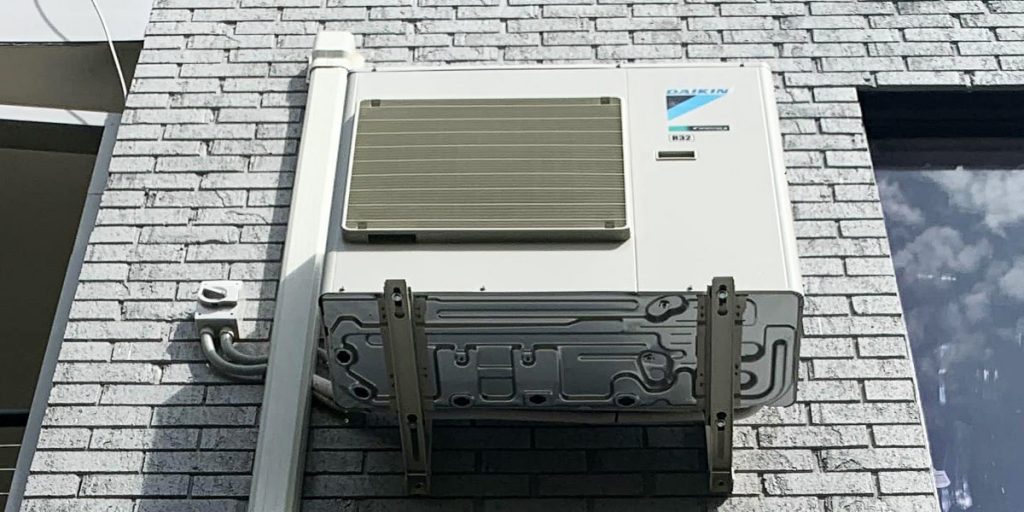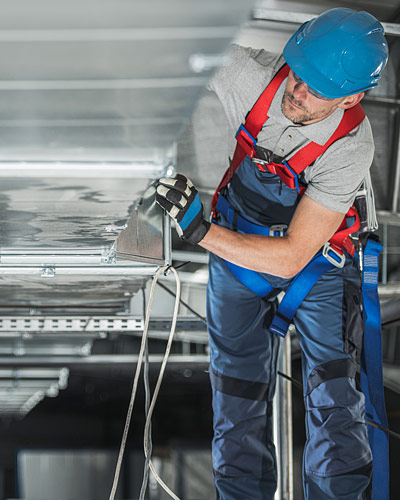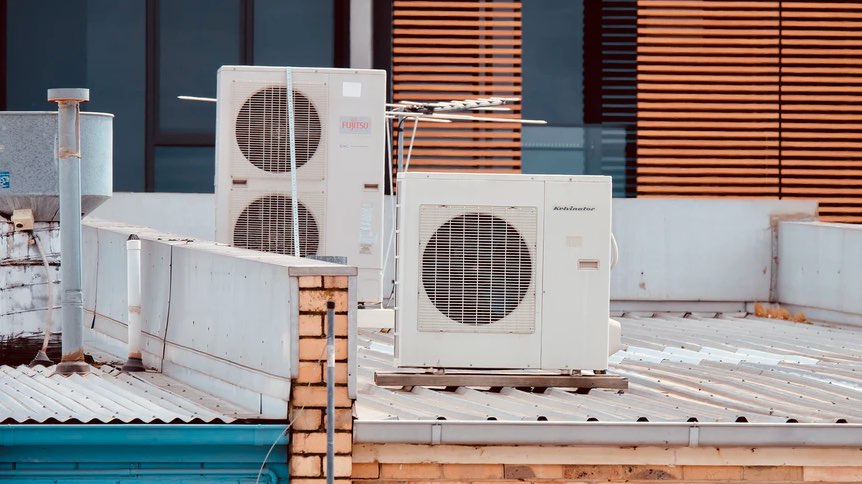Maintaining comfort during the hot summer months is essential for most businesses for their products or employee comfort, but how much is that really costing your business? In fact, electricity costs can increase by as much as 600% during the winter months compared to summer, spring, and fall.
The daily responsibilities of owning or managing a business sometimes make it easy to overlook the importance of scheduling for routine commercial HVAC maintenance. However, the system that heats and cools your commercial building plays a big role in the success of your business operations.
A faulty HVAC system cannot properly regulate the temperature in your work environment, and letting minor issues go too long can lead to more expensive repairs. So as you review your company’s maintenance plan, keep these benefits of commercial HVAC maintenance services in mind.
Commercial air conditioning systems are an eyesore. Depending on the size of the building, you may not want to give up the amount of space that large HVAC units require. Rooftop HVAC units are packaged systems installed on rooftops that tie directly into a building’s ductwork. In addition to lower installation costs, rooftop HVAC systems offer more options and versatility than others found on the market. Check out our range of Melbourne home paintings to help with your problem.
Your business’s commercial HVAC system is responsible for office comfort, energy efficiency, and a big chunk of your power bills; when that HVAC system is old, it causes problems for your business. From increased overhead to uncomfortable employees, your current HVAC system might be more detrimental to your office than you ever realized. On the other hand, a new commercial HVAC system has many benefits, and though you probably know about some, others are sure to surprise you.

What is an HVAC control system?
Originally, to save on utility costs, you would just turn up the temperature – or turn off the unit completely – on your thermostat and adjust it when you return.
Then, thermostats got a little bit smarter.
Most modern thermostats allow you to program a schedule that adjusts your preferred temperature based on the time of day.
While this is definitely an improvement from turning the system off or just having it run at the same temperature all day, it can still be extremely expensive.
Benefits
Greater Energy Efficiency
Commercial HVAC performs most efficiently with proper maintenance. Energy-efficient performance translates into lower utility bills. Because HVAC represents the lion’s share of your energy expenses, savings from efficient equipment operation can be substantial.
Cut costs from your business’s overhead when you upgrade your commercial HVAC system. Initially, an upgrade may not seem like an expense you want to take on. The energy efficiency of your new system will reduce your utility bills, though, and save your business money in the long term.
Thanks to the number of new energy-saving technologies on the market, options for reducing energy consumption are many. From energy recovery ventilation to desiccant dehumidification, Ambient Edge offers various units and add-on systems that best fit your business’s footprint and unique needs. In addition, we can help you figure out where you’re losing the most energy so we can address these issues while we help you choose and later install the new system.
Go Green
When you upgrade your HVAC system, you’ll help your business engage in more environmentally friendly practices. If you’re a business owner who has taken the time to reduce paper waste and greenify the office in other ways, then your commercial HVAC system should be the next step you take.
We offer a great array of Lennox products, so when you upgrade your commercial HVAC system, ask about programmable and smart thermostats, too. One of the best ways to leverage the new energy efficiency of your HVAC system is with a smart thermostat. Smart commercial thermostats make controlling your office’s interior environment simple. For example, you can set reminders for maintenance; create daily, weekly, or weekend schedules; and change the system to “away” by hitting one button.
Your air conditioning system not only interacts with your business but can also impact the environment. High-efficiency systems use less electricity compared to older ones and conserve the environment by reducing waste. Investing in a new HVAC system will also reduce carbon monoxide emissions that are harmful to the environment.
Lennox offers great options for smart thermostats that we can install with your new HVAC system. The Comfortsense 7500 Commercial Thermostat and the iComfort Wi-Fi Touchscreen Thermostat offer you the features you need for a greener office and simpler control over your HVAC system.
These days, many of the latest HVAC systems are built to be environmentally friendly and energy-efficient, which means that by getting rid of your old system, you’ll not only cut your energy costs, you’ll reduce your company’s carbon footprint.
HVAC systems require a large amount of energy to operate, which can significantly impact your company’s budget. However, regular maintenance reduces the load on the unit so that it operates more efficiently.
From lubricating parts so that there is less friction to promoting better airflow, HVAC services make it easier for a consistent temperature to be maintained in the building – without the unit cycling too frequently.
Remote Operation
After upgrading to a smart HVAC system, you no longer need to turn the air conditioner on and off manually as you can use your smartphone instead. In addition, improved technology allows you to plan the system in a way that suits your business.
Prevent Major Breakdowns
Regular commercial HVAC maintenance includes services that correct minor issues before they spiral into a complete breakdown. For instance, repairing a minor refrigerant leak prevents you from having to potentially shut down your business if the unit suddenly stops blowing cool air.
Rooftop HVAC installation provides easy, unobstructed access to the system by HVAC service personnel. More importantly, that access can occur 100% out of the way of your employees. Replacement components, man lifts, ladders and such will never block or stall your employees or customers. In addition, rooftop installation means less maintenance dust, debris, and noise.
Extend the Life Span of The Unit
Commercial HVAC systems all have a shelf life, and replacing an entire unit is a major expense in your company budget. Although every system will eventually need to be replaced, you get more from your initial investment by extending your HVAC system’s life span.
Commercial HVAC can last 20 years or more with proper preventive maintenance. Proper commercial HVAC maintenance means that the unit gets professionally serviced at the same time every year. Improper maintenance, also known as “run-to-failure” maintenance, is performed only after a unit has broken down completely. HVAC that’s barely maintained might last seven years, while “run-to-failure” systems last for about five years.
Flexibility:
Rooftop HVAC systems are modular units. This means that you can add to it if you expand or redesign the space. Furthermore, you can distribute the modules in different locations on the roof, if needed, depending on the building’s heating and cooling load requirements. When a building has multiple rooftop units, you can tailor the temperature settings for specific areas and track their energy usage.
The ability to locate two or more units some distance apart may reduce ductwork length, reducing duct cleaning costs. It may also make it easier to create separate temperature zones within the same building and permit better sizing of HVAC components. Our exclusive range of services for Domestic HVAC Melbourne will help you in many services, including Installation, or Maintenance, or Service & Repair.
Fewer Equipment Breakdowns and Fewer HVAC Repairs

Industry experts and commercial HVAC contractors agree that annual equipment maintenance is the best insurance against service interruptions. Studies show that up to 95 per cent of equipment breakdowns and HVAC repairs are directly attributable to a lack of proper maintenance.
A clog in the HVAC system’s drainage lines can lead to water leaks that create serious water damage. Because many systems are located in hidden areas of a commercial building, substantial damage can occur before the leak is noticed.
Commercial rooftop heating and cooling units require professional maintenance at least once a year to reduce mechanical problems, ensure efficiency and prevent unnecessary wear and tear. When a commercial building has rooftop HVAC units, a technician has easy access to all the modules. There is no need for the professional to search for individual units throughout the property. He also does not need to enter the building to repair or maintain the equipment. Keep in mind that if you do not perform basic maintenance tasks monthly or quarterly (e.g., change the filters, check for leaks or clean the fins), you may need professional maintenance services more often.
During a routine maintenance visit, the entire drainage system is checked for clogs that fill up drip pans and cause overflowing water to spill onto building materials. If a clog is found, the system is cleaned out, and any faulty components are replaced so that you can protect the structural integrity of your commercial building.
Rooftop HVAC installation provides easy, unobstructed access to the system by HVAC service personnel. More importantly, that access can occur 100% out of the way of your employees. Replacement components, man lifts, ladders and such will never block or stall your employees or customers. In addition, rooftop installation means less maintenance dust, debris, and noise.
No loss of useful space –
Rooftop installation of HVAC systems never results in loss of usable floor or yard space. All other locations, even basement installations in large buildings take up valuable space. A building with abundant outdoor space for an HVAC installation may still benefit from a rooftop install if it shortens the total duct length.
The land is a commodity. Rooftop units have all the heating and cooling components in a single package. This setup frees up space so you can use it for more attractive features, such as landscaping, extra parking or future building expansions.
Get Reliable Indoor Temperatures
Does your office have one room that’s always too hot, while the rest of the rooms are freezing? Are some of your employees running fans at their desks, while others are bundled up in July like it’s the middle of winter? The older your commercial HVAC system is, the more likely you’ll have temperature inconsistencies within your office. Duct problems, equipment malfunctions, and poor thermostat calibration all contribute to indoor temperature issues.
When your commercial system is running efficiently, the temperatures in your business environment should stay fairly consistent. Consistent temperatures increase employee productivity and encourage customers to visit the building. A professional HVAC technician can also adjust the thermostat settings for optimum efficiency.
Sometimes, it’s simply a matter of the building’s construction, especially if rooms and suites have been added to the original structure. Maybe ductless is a better solution for your office building, or your ducts need some repair and replacement while installing your new HVAC system. No matter the problems, a new commercial HVAC system will provide more consistent temperatures inside your office.
Even if you don’t have inconsistencies within your office, you might find it’s not easy to keep your office at a temperature that makes everyone comfortable. So when we install your new commercial HVAC system, we’ll also assess the infrastructure of your building to ensure that the treated air reaches the right spots at the right strength.
Increase Employee Comfort
At this point, you’re probably only imagining energy savings when you think about replacing your commercial HVAC system. We’re here to tell you that you’ll reap more rewards than just lower energy bills when you upgrade. By having a consistent, comfortable temperature in your office, you’ll increase employee productivity.
Workplaces that are too cold or too hot negatively affect employees. The Association for Psychological Science (APS) examined several studies and surveys relating to employee productivity and office temperature. The findings are consistent across the board: people (especially women) have a harder time being productive when they’re too cold. The same is true of all workers when the temperature is too hot. For example, if the temperature is below 68 degrees or above 77 degrees, workers face productivity issues because of the temperature.
One of the studies that the APS examined estimates that employers save about $2 per worker per hour in productivity costs when the temperature is comfortable. Take a look around the office tomorrow morning. Is anyone trying to type while wearing gloves? When you need to turn the heat up a few extra degrees in the winter or make the AC a bit colder in summer, do it. With a new commercial HVAC system, you’ll already be saving money every month on your electricity bills. Making your employees comfortable will only increase their productivity.
It’s hard to concentrate on getting your work done when you’re too hot or too cold, and if you have an old HVAC system that heats or cools unevenly, you may be depriving your workers of comfort. Workers at a comfortable temperature are usually happier and more productive, so swap out that old HVAC system.
Optimized HVAC performance means consistent indoor temperatures and balanced humidity levels throughout a building with no hot or cold spots. Healthy indoor air is also a feature of optimized indoor comfort. Air is clean and fresh with no foul odours.

Reduced Operating Costs
Proper commercial HVAC maintenance can reduce operating costs by up to 40 per cent. Fewer HVAC repairs and fewer equipment breakdowns not only cut costs overall but also help your business to function smoothly. That keeps customers happy and employees on track. Check out HVAC Design and Installation Services page which has everything you might need near you.
An HVAC system that constantly requires repairs can be a very costly investment. Instead of trying to hang onto “old faithful,” replace it with a new HVAC system that you can rely on. You’ll save money, time, and effort.
Less noise pollution:
While many modern HVAC units are quieter than their predecessors, they still make a distinguishable noise. In addition, roof-mounted commercial air conditioning systems are out of earshot, helping the building seem quieter.
A commercial HVAC unit located on the ground outside a building may prevent building occupants from hearing the system. However, it will not prevent workers, customers, or neighbouring businesses from hearing the system’s operation as a rooftop installation will.
Healthy Workers
Old HVAC systems are often the victims of dirt and dust buildup. When this happens, these particles travel throughout your HVAC vents and into the air, contaminating them. Contaminated air can lead to increased illnesses, asthma symptoms, allergies, and more; with a new HVAC system, your workers will enjoy clean air and (hopefully!) stay healthy.
Every business has a responsibility to do its part to protect the health of any customers and employees that spend time in the building. Unfortunately, poor air quality is a significant cause of allergies and illnesses.
HVAC systems help to control humidity in indoor environments, and a poorly functioning system can create an environment that promotes mould growth. Therefore, routine maintenance checks help to keep mould and fungus levels down in commercial buildings.
The air filters in the commercial unit are also designed to trap dirt and debris that contributes to indoor allergies. First, make sure that your building’s maintenance team members check the air filters according to the recommended schedule. Then, arrange for professional services to make sure they function properly.
The air ducts that connect to the system should also be checked regularly to determine if there is a need for cleaning. Over time, small particles such as mould spores, dust and rodent droppings can get into the ductwork. By cleaning the ducts, you effectively reduce the airborne allergens in the building.

